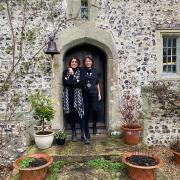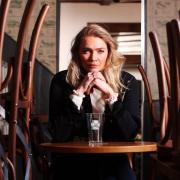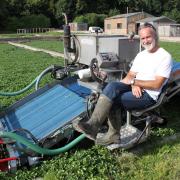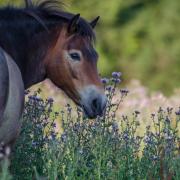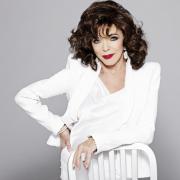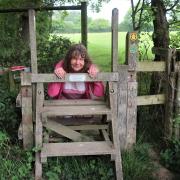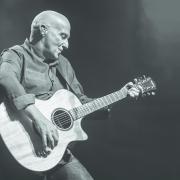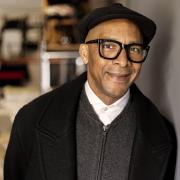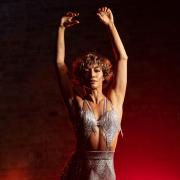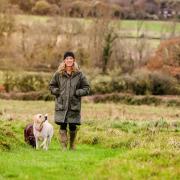Actor Michael Simkins fell in love with the greasepaint while at his parents’ sweet shop in Brighton. But he also enjoys a successful career as a writer. So which is his first love? Would the real Michael Simkins please stand up?
Michael Simkins leads a curiously double life. If you’re familiar with Simkins the actor, you may have seen him in any number of plays or TV favourites, from King Lear at the National to Foyle’s War. But you may also know Simkins the writer, who pens a regular humour column in The Sunday Telegraph and has written a series of award-winning books on subjects as diverse as cricket and acting.
I first came across him in 2004 when he published What’s My Motivation?, a blisteringly funny, self-deprecating account of the ritual humiliations of the jobbing actor. It became required reading for any would-be thespian. Now he has brought out The Rules of Acting, which is more of a practical handbook for aspiring actors – often just as funny, but full of good, hard-won wisdom.
Extremely hard-won, in some instances. In a little section on acting in advertisements, he warns that “auditioning for ads is the single most humiliating, degrading activity known to man”. Over a period of just a few years, he auditioned for 1,000 ads and was selected for eight.
He also reveals he has taken virtually every role in whodunits such as Lewis and Midsomer Murders, so is well-qualified to advise anyone cast as the victim to make sure they die in a comfortable position. “You don’t want to have to lie jack-knifed, chest upwards, over a chaise longue for hours on end while DCI Barnaby or Jack Frost film three pages of dialogue over your inert body,” he says. “Behind a sofa is the safest bet.”
You might not guess it from the book, but Michael, 58, who is married to the actress Julia Deakin, has had a highly successful career. He did rep with Alan Ayckbourn in Scarborough, played opposite Michael Gambon in A View From the Bridge, was in Sam Mendes’ Company and took over leads in both Chicago and Mamma Mia. He’s an excellent theatrical all-rounder, but his book dwells more on disaster than success. As he expresses it, “the bad times are funnier”.
And when things go wrong, boy, do they go wrong. “I witnessed a near-catastrophe once in a regional production of Cinderella, when one of the two ponies pulling the heroine’s silver coach slipped on a pile of newly-expressed manure and nearly dragged the entire procession into the orchestra pit,” he shudders. “The sight of the musical director trying to conduct with one hand while holding up the splayed palm of his other to protect himself from the imminent descent of half a hundredweight of horseflesh and balsa wood will live with me for ever.”
But of all the horrors the fates can drop on an unsuspecting actor, the most traumatising is being “off” — actors’ shorthand for missing your entrance. It’s the ultimate professional betrayal, condemning your onstage colleagues to stand gaping like fish, without words to speak or anybody to speak them to.
“In a conventional drama, shooting your cuffs buys a second or two. Still no knock on the door? It’s time for the Knick-Knack Alternative. You walk round the set in an unhurried yet determined manner, picking up any available prop and examining it.
“If the errant actor still hasn’t appeared, he’s either asleep, dead or — as happened during last year’s touring production of Yes, Prime Minister, in which I played Sir Humphrey Appleby — he’s inexplicably turned off the Tannoy in his dressing-room. The actor playing the Kumranistan ambassador failed to appear during a Wednesday evening show at the Everyman Theatre, Cheltenham.
“Unfortunately, the actor playing Prime Minister Jim Hacker was left marooned on stage with my Sir Humphrey, allowing us to implement a rarely seen variant: the ‘Double Knick Knack’. So, for a while, we both wandered about, shooting our cuffs and inspecting various props. The missing actor, meanwhile, was three floors up regaling his friends in his dressing room about the correct way to grow coriander.
“Eventually, the audience realised something was wrong, so the Prime Minister and I decided to activate the nuclear option – a chorus of There’s No Business Like Showbusiness. I’m pleased to report that the audience thoroughly enjoyed our impromptu chorus — so much so that when the ambassador did eventually blunder on, he got the biggest round of the night.”
Michael, with characteristic gallows humour, says it’s a good idea to put people off acting if you possibly can. “Acting is a profession for those who can’t imagine being able to live their lives unless that’s all they can do,” he says. Fittingly, he claims to have qualified resoundingly for this category.
The young Simkins moved to Brighton in 1963 when his parents opened a sweet shop in North Road. “People often ask what it was like growing up in a sweet shop. Well, what do you think? I had free access to as many sweets as I could cram down my gullet.”
He remembers his childhood with great fondness. “The shop attracted this great sea of humanity which washed in every morning and again at rush hour for sweets, dirty magazines, stockings, Christmas cards, crisps, ciggies and rolling tobacco. I knew all the customers and occasionally served them, so I never lacked confidence.”
Family life was dominated by his extrovert father, Benny, whose life was jazz and dance band music. At Christmas, his parents staged great family get-togethers, which his Auntie Lena unfailingly recorded on an old Grundig tape recorder – his dad singing songs, Uncle Percy on the drums and Auntie Glad playing ragtime like nobody’s business. “I still have those recordings and it’s an extraordinary bittersweet door back into my childhood,” he says. “The BBC played an extract on the Christmas edition of Saturday Live, and Fi Glover said it was the best item they’d ever featured.”
By his own admission, Michael didn’t do brilliantly at Brighton, Hove and Sussex Grammar School. An early report read: “Simkins isn’t a particularly gifted pupil, but I do think he’s going to be an actor.” This wasn’t as prescient as it seemed: he had already become immersed in the world of Gilbert & Sullivan.
“While my school chums were discovering sex, drugs and rock ‘n’ roll, I was performing The Yeoman of the Guard with the Bexhill Operatic Society. I missed out on a crucial part of my teens, but it did mean that when I went to RADA I had a facility for acting.”
He graduated in the late 1970s in the same year as Timothy Spall and Juliet Stevenson, and went straight into rep where he did something like 80 touring plays in the next six years. The highlight of those early years was performing in Ayckbourn’s resident company at Scarborough.
“I did some wonderful stuff with Alan, including a couple of world premieres, and he took me to the National Theatre when they gave him a company there. That was a big break. I did a famous production of Arthur Miller’s A View From the Bridge, starring Michael Gambon, in which I played Marco, the huge itinerant Sicilian brother [for which he received a best actor nomination].
“It’s probably evident I’ve never quite made it in film or television. I’ve done lots of parts, but the Carson in Downton Abbey-type role that transforms your life at a single stroke has eluded me. If I had to pick out one, doing a scene with Meryl Streep in The Iron Lady would take some beating.
“Big stars can be horrible to supporting players, but she was lovely. When she arrived on set, she said (here, he adopts his best Margaret Thatcher accent), ‘Hello everyone, I’m Meryl, but if I drop this bloody accent just once I’ll never get the damned thing back.’ So she spent the whole day as Lady Thatcher, which was surreal.”
But what got Simkins into the scribbling game? Well, it all began when someone lent him a book about Britain’s worst-ever train crash which had taken place during the First World War. He later wrote about the incident and offered it to The Guardian, which ran it to coincide with the anniversary of the disaster. Out of that came a weekly column and then a publishing contract.
Since then he has written several more acclaimed books, but is best known for What’s My Motivation? “It was the first book that told actors what it was really like. There were lots about stardom, but nobody had written what it was like to do a safety training video at Tesco in Maidstone at nine on a Thursday morning.”
He is thankful for his writing success, but it has led to something of an identity crisis. “On the rare occasions when I meet people like Boris Johnson, I’m very happy to be introduced as Michael Simkins, the writer. But what chills me to the marrow is that occasionally I meet agents and they say, ‘You’re that writer, aren’t you?’ And I say, ‘No. Writing is what I do in my spare time. I’m an actor and could you give me a job please?’ So there has been a slight price to pay. I’ve spent so much time writing, I haven’t acted as much.”
All that is about to change. When we spoke, he didn’t have a day’s acting work lined up. Now he is poised to appear alongside Felicity Kendal and Simon Shepherd in Noel Coward’s Hay Fever at the Theatre Royal, Brighton. Let’s hope, for his sake, that the dressing-room Tannoy will be working.
***
My Favourite Sussex
Restaurant - The Melrose on Kings Road, Brighton. What could be nicer? Superior fish and chips on white tablecloths in the fresh air, with sunshine and sea views. It has a nice informal feel and you can eat and drink well with plenty of change from a tenner. It captures the saucy, raffish and knockabout feel of Brighton.
Pub - The Laughing Fish in Isfield. Great food and beer. It’s also a stone’s throw from the village cricket ground, where I usually made runs in my playing days. And as all social cricketers know, nothing enhances a pie and pint like knowing you’ve scored 50 beforehand.
Shop - Rin Tin Tin in North Road, Brighton. It’s an exotic emporium of bygones from the mid 20th century – posters, toys and collectables. A visit offers an orgy of nostalgia and I rarely leave without making a purchase (it’s also only two doors up from my childhood home, which only enhances its powers of evocation).
View - Firle Beacon on the South Downs Way. Its position usually means you’ve walked a good distance to reach it, which only makes the subsequent view – the vast English Channel in one direction and unspoilt Sussex countryside on the other – even more pleasing.
Place to visit - The County Ground, Hove. It’s where Sussex play cricket. With luck, I hope to pass my declining days there – watching the summer game and dozing in a stripy deckchair to the sound of leather on willow.
***
The Rules of Acting by Michael Simkins (Ebury, £11.99) is available now.
--------------------------------------------------
Read on
Actor Kevin Kennedy on why Brighton has so much to offerNatasha Kaplinsky on why Sussex has a special place in her heartCelebrities and other famous figures who went to school in Sussex




